2017年5月SAT阅读机经详解
2017年5月SAT阅读机经详解
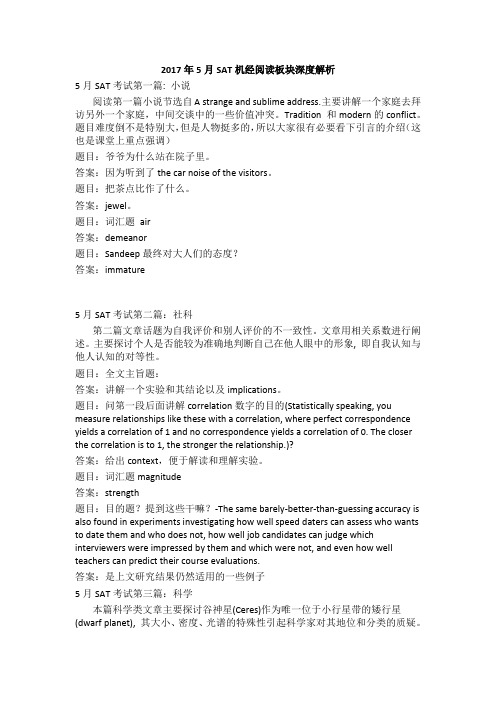
2017年5月SAT机经阅读板块深度解析5月SAT考试第一篇: 小说阅读第一篇小说节选自A strange and sublime address.主要讲解一个家庭去拜访另外一个家庭,中间交谈中的一些价值冲突。
Tradition 和modern的conflict。
题目难度倒不是特别大,但是人物挺多的,所以大家很有必要看下引言的介绍(这也是课堂上重点强调)题目:爷爷为什么站在院子里。
答案:因为听到了the car noise of the visitors。
题目:把茶点比作了什么。
答案:jewel。
题目:词汇题air答案:demeanor题目:Sandeep最终对大人们的态度?答案:immature5月SAT考试第二篇:社科第二篇文章话题为自我评价和别人评价的不一致性。
文章用相关系数进行阐述。
主要探讨个人是否能较为准确地判断自己在他人眼中的形象, 即自我认知与他人认知的对等性。
题目:全文主旨题:答案:讲解一个实验和其结论以及implications。
题目:问第一段后面讲解correlation数字的目的(Statistically speaking, you measure relationships like these with a correlation, where perfect correspondence yields a correlation of 1 and no correspondence yields a correlation of 0. The closer the correlation is to 1, the stronger the relationship.)?答案:给出context,便于解读和理解实验。
题目:词汇题magnitude答案:strength题目:目的题?提到这些干嘛?-The same barely-better-than-guessing accuracy is also found in experiments investigating how well speed daters can assess who wants to date them and who does not, how well job candidates can judge which interviewers were impressed by them and which were not, and even how well teachers can predict their course evaluations.答案:是上文研究结果仍然适用的一些例子5月SAT考试第三篇:科学本篇科学类文章主要探讨谷神星(Ceres)作为唯一位于小行星带的矮行星(dwarf planet), 其大小、密度、光谱的特殊性引起科学家对其地位和分类的质疑。
2017年5月SAT亚太真题阅读(2)
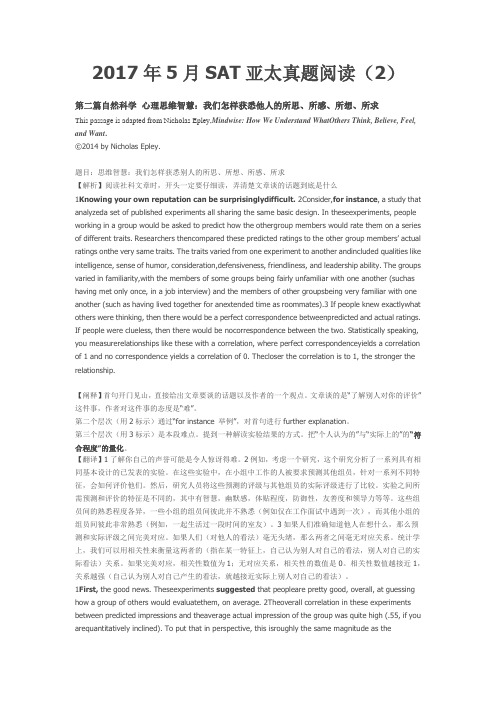
2017年5月SAT亚太真题阅读(2)第二篇自然科学心理思维智慧:我们怎样获悉他人的所思、所感、所想、所求This passage is adapted from Nicholas Epley,Mindwise: How We Understand WhatOthers Think, Believe, Feel, and Want.©2014 by Nicholas Epley.题目:思维智慧:我们怎样获悉别人的所思、所想、所感、所求【解析】阅读社科文章时,开头一定要仔细读,弄清楚文章谈的话题到底是什么1Knowing your own reputation can be surprisinglydifficult. 2Consider,for instance, a study that analyzeda set of published experiments all sharing the same basic design. In theseexperiments, people working in a group would be asked to predict how the othergroup members would rate them on a series of different traits. Researchers thencompared these predicted ratings to the other group members’ actual ratings onthe very same traits. The traits varied from one experiment to another andincluded qualities like intelligence, sense of humor, consideration,defensiveness, friendliness, and leadership ability. The groups varied in familiarity,with the members of some groups being fairly unfamiliar with one another (suchas having met only once, in a job interview) and the members of other groupsbeing very familiar with one another (such as having lived together for anextended time as roommates).3 If people knew exactlywhat others were thinking, then there would be a perfect correspondence betweenpredicted and actual ratings. If people were clueless, then there would be nocorrespondence between the two. Statistically speaking, you measurerelationships like these with a correlation, where perfect correspondenceyields a correlation of 1 and no correspondence yields a correlation of 0. Thecloser the correlation is to 1, the stronger the relationship.【阐释】首句开门见山,直接给出文章要谈的话题以及作者的一个观点。
2017年5月SAT亚太真题阅读(5)
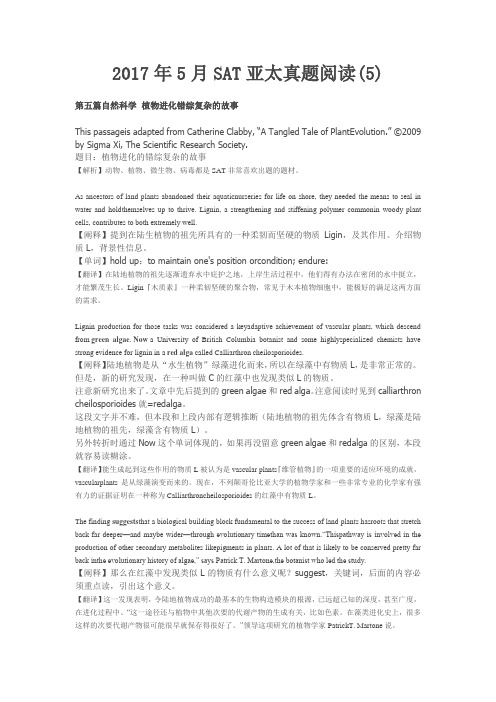
2017年5月SAT亚太真题阅读(5)第五篇自然科学植物进化错综复杂的故事This passageis adapted from Catherine Clabby, “A Tangled Tale of PlantEvolution.” ©2009 by Sigma Xi, The Scientific Research Society.题目:植物进化的错综复杂的故事【解析】动物、植物、微生物、病毒都是SAT非常喜欢出题的题材。
As ancestors of land plants abandoned their aquaticnurseries for life on shore, they needed the means to seal in water and holdthemselves up to thrive. Lignin, a strengthening and stiffening polymer commonin woody plant cells, contributes to both extremely well.【阐释】提到在陆生植物的祖先所具有的一种柔韧而坚硬的物质Ligin,及其作用。
介绍物质L,背景性信息。
【单词】hold up:to maintain one's position orcondition; endure:【翻译】在陆地植物的祖先逐渐遗弃水中庇护之地,上岸生活过程中,他们得有办法在密闭的水中挺立,才能繁茂生长。
Ligin『木质素』一种柔韧坚硬的聚合物,常见于木本植物细胞中,能极好的满足这两方面的需求。
Lignin production for those tasks was considered a keyadaptive achievement of vascular plants, which descend from green algae. Now a University of British Columbia botanist and some highlyspecialized chemists have strong evidence for lignin in a red alga called Calliarthroncheilosporioides.【阐释】陆地植物是从“水生植物”绿藻进化而来,所以在绿藻中有物质L,是非常正常的。
(完整版)SATog5阅读真题解析
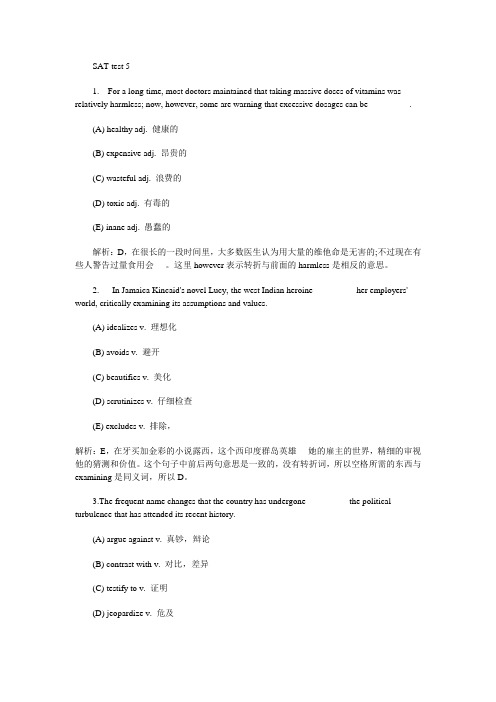
SAT test 51.For a long time, most doctors maintained that taking massive doses of vitamins was relatively harmless; now, however, some are warning that excessive dosages can be _________.(A) healthy adj. 健康的(B) expensive adj. 昂贵的(C) wasteful adj. 浪费的(D) toxic adj. 有毒的(E) inane adj. 愚蠢的解析:D,在很长的一段时间里,大多数医生认为用大量的维他命是无害的;不过现在有些人警告过量食用会----。
这里however表示转折与前面的harmless是相反的意思。
2. In Jamaica Kincaid's novel Lucy, the west Indian heroine _________ her employers' world, critically examining its assumptions and values.(A) idealizes v. 理想化(B) avoids v. 避开(C) beautifies v. 美化(D) scrutinizes v. 仔细检查(E) excludes v. 排除,解析:E,在牙买加金彩的小说露西,这个西印度群岛英雄----她的雇主的世界,精细的审视他的猜测和价值。
这个句子中前后两句意思是一致的,没有转折词,所以空格所需的东西与examining是同义词,所以D。
3.The frequent name changes that the country has undergone _________ the political turbulence that has attended its recent history.(A) argue against v. 真钞,辩论(B) contrast with v. 对比,差异(C) testify to v. 证明(D) jeopardize v. 危及(E) sustain v. 支撑解析:C,这个国家经历了频繁的国名变更---这个国家的近点史上的政治动乱。
2017年5月SAT亚太真题阅读(1)
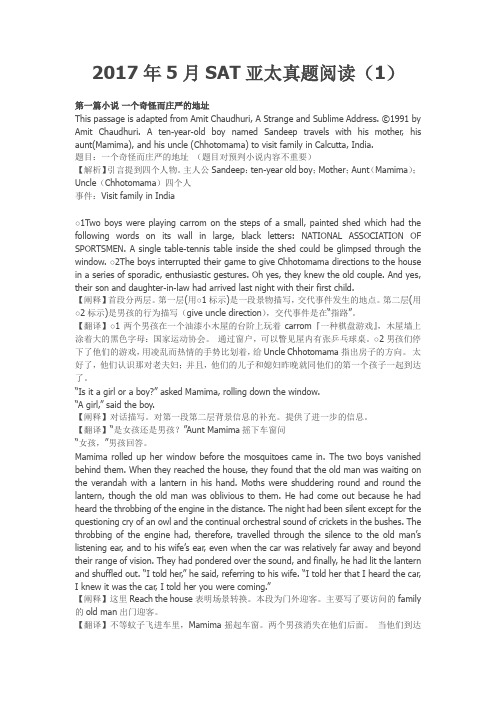
2017年5月SAT亚太真题阅读(1)第一篇小说一个奇怪而庄严的地址This passage is adapted from Amit Chaudhuri, A Strange and Sublime Address. ©1991 by Amit Chaudhuri. A ten-year-old boy named Sandeep travels with his mother, his aunt(Mamima), and his uncle (Chhotomama) to visit family in Calcutta, India.题目:一个奇怪而庄严的地址(题目对预判小说内容不重要)【解析】引言提到四个人物。
主人公Sandeep:ten-year old boy;Mother;Aunt(Mamima);Uncle(Chhotomama)四个人事件:Visit family in India○1Two boys were playing carrom on the steps of a small, painted shed which had the following words on its wall in large, black letters: NATIONAL ASSOCIATION OF SPORTSMEN. A single table-tennis table inside the shed could be glimpsed through the window. ○2The boys interrupted their game to give Chhotomama directions to the house in a series of sporadic, enthusiastic gestures. Oh yes, they knew the old couple. And yes, their son and daughter-in-law had arrived last night with their first child.【阐释】首段分两层。
2017年SAT阅读小说大意的技巧讲解:如何阅读SAT文学类篇章?
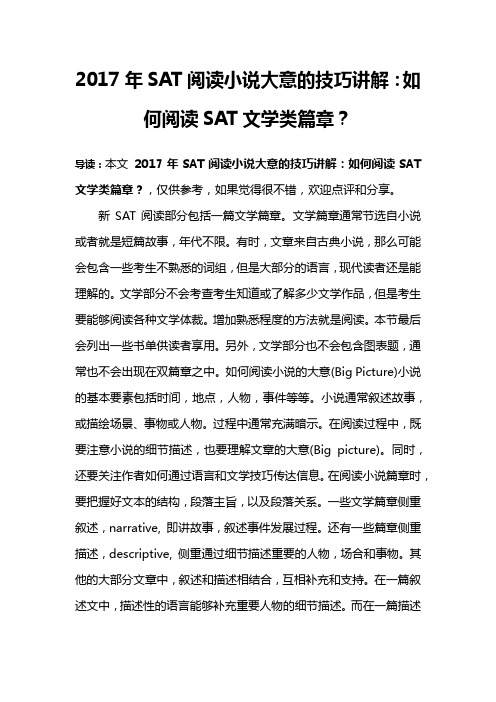
2017年SAT阅读小说大意的技巧讲解:如何阅读SAT文学类篇章?导读:本文2017年SAT阅读小说大意的技巧讲解:如何阅读SAT 文学类篇章?,仅供参考,如果觉得很不错,欢迎点评和分享。
新SAT阅读部分包括一篇文学篇章。
文学篇章通常节选自小说或者就是短篇故事,年代不限。
有时,文章来自古典小说,那么可能会包含一些考生不熟悉的词组,但是大部分的语言,现代读者还是能理解的。
文学部分不会考查考生知道或了解多少文学作品,但是考生要能够阅读各种文学体裁。
增加熟悉程度的方法就是阅读。
本节最后会列出一些书单供读者享用。
另外,文学部分也不会包含图表题,通常也不会出现在双篇章之中。
如何阅读小说的大意(Big Picture)小说的基本要素包括时间,地点,人物,事件等等。
小说通常叙述故事,或描绘场景、事物或人物。
过程中通常充满暗示。
在阅读过程中,既要注意小说的细节描述,也要理解文章的大意(Big picture)。
同时,还要关注作者如何通过语言和文学技巧传达信息。
在阅读小说篇章时,要把握好文本的结构,段落主旨,以及段落关系。
一些文学篇章侧重叙述,narrative, 即讲故事,叙述事件发展过程。
还有一些篇章侧重描述,descriptive, 侧重通过细节描述重要的人物,场合和事物。
其他的大部分文章中,叙述和描述相结合,互相补充和支持。
在一篇叙述文中,描述性的语言能够补充重要人物的细节描述。
而在一篇描述性文章中,叙述性的文字能够帮助刻画主题。
新SAT节选的文章,文章的大意发展(big picture)包括两种,一种是叙述故事矛盾,冲突。
包括事件起因,发展和结尾。
另一种是对比,对比人物或场景。
以下举例说明如何阅读得出小说的大意:例:The following passage is adapted from Leo Tolstoy's 1873 novel, Anna Karenina (translated from the original Russian by Constance Garnett). Prior to this excerpt, one of the major characters, Levin, has realized that he is in love with his longtime friend Kitty Shtcherbatsky.At four o'clock, conscious of his throbbing heart, Levin stepped out of a hired sledge at the Zoological Gardens, and turned along the path to the frozen mounds and the skating ground, knowing that he would certainly find her there, as he had seen the Shtcherbatskys’ carriage at the entrance.It was a bright, frosty day. Rows of carriages, sledges, drivers, and policemen were standing in the approach. Crowds of well-dressed people, with hats bright in the sun, swarmed about the entrance and along the well-swept little paths between the little houses adorned with carving in the Russian style. The old curly birches of the gardens, all their twigs laden with snow, looked as though freshly decked in sacred vestments.He walked along the path towards the skating-ground, and kept saying tohimself—“You mustn't be excited, you must be calm. What's the matter with you? What do you want? Be quiet, stupid,” he conjured his heart. And the more he tried to com- pose himself, the more breathless he found himself. An acquaintance met him and called him by his name, but Levin did not even recognize him. He went towards the mounds, whence came the clank of the chains of sledges as they slipped down orwere dragged up, the rumble of the sliding sledges, and the sounds of merry voices. He walked on a few steps, and the skating-ground lay open before his eyes, and at once, amidst all the skaters, he knew her.He knew she was there by the rapture and the ter-ror that seized on his heart. She was standing talking to a lady at the opposite end of the ground. There was apparently nothing striking either in her dress or her attitude. But for Levin she was as easy to find in that crowd as a rose among nettles. Everything was made bright by her. She was the smile that shed light on all round her. MIs it possible I can go over there on the ice, go up to her?” he thought. The place where she stood seemed to him a holy shrine, unap-proachable, and there was one moment when he was almost retreating, so overwhelmed was he with terror. He had to make an effort to master himself, and to remind himselfthat people of all sorts were moving about her, and that he too might come there to skate. He walked down, for a long while avoiding looking at her as at the sun, but seeing her, as one does the sun, without looking.On that day of the week and at that time of day people of one set, all acquainted with one another, used to meet on the ice. There were crack skaters there, showing off their skill, and learners clinging to chairs with timid> awkward movements, boys, and elderly people skating with hygienic motives. They seemed to Levin an elect band of blissful beings because they were here, near her. All the skaters, it seemed, with perfect self-possession, skated towards her, skated by her, even spoke to her, and were happy, quite apart from her, enjoying the capital ice and the fine weather.Nikolay Shtcherbatsky, Kitty's cousin, in a short jacket and tight trousers, was sitting on a garden seat with his skates on. Seeing Levin, he shouted to him:“Ah, the first skater in Russia! Been here long? First-rate ice—do put your skates on.”首先我们看斜体字部分:The following passage is adapted from Leo Tolstoy's 1873 novel, Anna Karenina (translated from the original Russian by Constance Garnett). Prior to this excerpt, one of the major characters, Levin, has realized that he is in love with his longtime friend Kitty Shtcherbatsky.通过斜体字部分,我们可以得出该小说节选自托尔斯泰的小说《安娜卡列尼娜》,以及节选部分的前情提要。
2017年5月13日雅思阅读机经预测

>>>更多请点击:2017年5⽉13⽇雅思阅读机经预测特重点:第⼀篇:Music: Language We All Speak(⾳乐通⽤语⾔)第⼆篇:TV addiction,第三篇:Communicating Styles and Conflice(交流的⽅式与冲突),第四篇: Amateur Naturalists(业余⾃然学家),第五篇:A second look at twin studies (双胞胎研究),第六篇: Going nowhere fast,第七篇:艺术家与指纹(Artists’Fingerprints)第⼋篇:Numeracy :can animals tell numbers?(动物数字能⼒),第九篇: The "Extinct " Grass in Britain (英国灭绝的某种草),第⼗篇Save Endangered Language拯救濒危语⾔(⽂化类),第⼗⼀篇:An Alternative Approach of Farming in Honduras,第⼗⼆篇:Health in the Wild(野⽣动物健康)最重点:第⼀篇:Being Left-handed in a Right-handed World(左右撇⼦),第⼆篇:Fishbourne Roman Palace 罗马宫殿, 第三篇:滑⽯粉(Talc Powder)第四篇:California’s age of Megafires(加州森林⽕灾),第五篇:Ambergris(龙涎⾹),第六篇:Internal and External Marketing(内部和外部营销)第七篇:欧洲⾼温,第⼋篇:The Farmers! Parade of history,第九篇:What cookbooks really teach us,第⼗篇:Implication of False Belief Experiments(错误信念实验),第⼗⼀篇:the conquest of malaria in italy(意⼤利的虐疾),第⼗⼆篇:Stress of Workplace(⼈类⼯作压⼒),第⼗三篇:The History of building telegraph lines(电报的发展史),第⼗四篇:安慰剂效应,第⼗五篇乐观与健康Optimism and health,第⼗六篇: 霸王龙的最新研究,第⼗七篇:The seedhunters(种⼦猎⼈),第⼗⼋篇:英国海岸考古学,第⼗九篇:猛犸象灭绝Mammoth Kill,第⼆⼗篇:classifying society(社会分层)第⼆⼗⼀篇:Global warming revent poles from melting(北极冰川融化)⼀般重点第⼀篇: 过⼭车,第⼆篇:指纹识名画,第三篇:郁⾦⾹,第四篇:古苏格兰乌鸦造窝⼯具,第五篇捕捉蚂蚁,第六篇:鳄鱼,第七篇:挽救鱼鹰,第⼋篇:新西兰珊瑚鱼,第九篇澳洲能源,第⼗篇短信投票,第⼗⼀篇: The Lost City(失落的城市),第⼗⼆篇:地图发展史,第⼗三篇:⽕星探险,第⼗四篇:快乐成因,第⼗五篇:苏梅克9号慧星,第⼗六篇:⽣态旅游,第⼗七篇:过⼭车,第⼗⼋篇History ofSahara撒哈拉历史(历史类),第⼗九篇:新⼿与专家,第⼆⼗篇:沙丘,第⼆⼗⼀篇:性格与⼈际关系次重点:第⼀篇:录⾳发展史、第⼆篇:肥胖成因、第三篇:从众现象Conformity、第四篇奥运⽕炬的发展、第五篇⼉童的智商、第六篇: 英国⼈对正确拼写的态度、第七篇:Rainmaker、第⼋篇:修建古堡、第九篇:龙涎⾹与琥珀、第⼗篇:噪⾳的影响、第⼗⼀篇:天赋与练习,第⼗⼆篇:某种松树、第⼗三篇:美国⼿语、第⼗四篇:左右⼿成因; 第⼗五篇:沙漠温室 Rainmaker、第⼗六篇:学术道德、第⼗七篇:健脑药、、第⼗⼋篇:打⽕⽯的⼤量⽣产、第⼗九篇:加州森林防⽕、第⼆⼗篇:⾃然节奏、第⼆⼗⼀篇:鸟类的智慧、第⼆⼗⼆篇:海洋发电、第⼆⼗三篇⽣物钟、第⼆⼗四篇:Power and Space、第⼆⼗五篇:清洁海滩、第⼆⼗六篇:法国古堡、第⼆⼗七篇:体育赛事与兴奋、第⼆⼗⼋篇:提炼饮⽤⽔、第⼆⼗九篇: 纹⾝有空看看:第⼀篇:英国建筑、第⼆篇:厄尔尼诺与⽔鸟、第三篇:B湖研究; 第四篇:⼤脑训练、第五篇: 幸福感与选择、第六篇:儒⾉;第七篇:清洁剂、第⼋篇:早期⼈类航海迁徙、第九篇:科幻⼩说、第⼗篇:精益⽣产、第⼗⼀篇:解密记忆⼒、第⼗⼆篇:古头⾻容貌重现、第⼗三篇:⽣物多样性、第⼗四篇:茶的历史与发展、第⼗五篇:双胞胎研究、第⼗六篇:明星员⼯与企业、第⼗七篇:新式科技对历史教学的影响、第⼗⼋篇:天才⼉童、第⼗九篇:失败与创新、第⼆⼗篇:电⼦书及数学⾳乐、第⼆⼗⼀篇:植物纯净⽔、第⼆⼗⼆篇:学习历史的意义、第⼆⼗三篇:语⾔对商业的作⽤、第⼆⼗四篇:⼤象沟通⽅式及构造、第⼆⼗五篇:⾹味猎取者Perfume hunter,第⼆⼗六篇: 蝴蝶的保护⾊、。
2017年5月SAT备考

2017年5月SAT考试前该如何准备2017年5月SAT考试前如何准备【备考建议】!截止目前距离五月份亚洲考试越来越近,如何在考前有效的利用备考时间,进行针对性复习呢?下面北京英培教育为大家分享一些5月份考前备考建议,供大家参考。
备考资料推荐:1、OG的四套题目2、2016年3月/5月/10月新SAT真题,2017年1月份新SAT考试真题3、可汗SAT资料4、普林斯顿资料SAT语法部分备考重点:1、复习之前新OG/真题的语法点;2、每两天做一套题目,题目来源:OG, 可汗,真题。
特别提醒:1)必须背记的语法知识点:句子连接的正确方式,连词副词区分,虚拟语气三原则,标点符号使用规则,逻辑主语常见的考查方式;2)阅读类题型做题步骤:必须看题目,找题目的关键字,对应回文章找相关上下文,分析句子逻辑关系,选择答案。
SAT阅读部分备考重点:1、对号入座自己阅读的问题:a.篇目类型:看得最懵的/花时间最长的/错得最多的;b.题型:看到就觉得紧张的/做题纠结的/对答案“我就知道会错”的;c.习惯:过于主观/看题快/脑洞大…把每道错题的原因都分析出当时为什么会错就知道了;d.时间分配:science/social,science(11-12),history(13-14),literature(11-13),paired(13-14),谨供参考,请根据自身情况酌情调整。
别忘了留出涂答题卡的时间啊。
2、有答案之后再对应解决:a.篇目类型:精读分析结构,记忆影响做题的生词。
history要注意培养对态度词的敏感程度,literature要注意积累描述词;b.题型:把同类题归类,把每个做题步骤分析清楚,理清思路;c.习惯:做题前回顾一下自己有哪些不好的习惯,做题的时候慢一点,留心一点去改。
特别提醒:审题时请留意题干限制,选项看清楚看完再选;d.时间分配:哪种类型的文章慢了就去做精读,哪种类型的题目时间长就去做同类分析。
- 1、下载文档前请自行甄别文档内容的完整性,平台不提供额外的编辑、内容补充、找答案等附加服务。
- 2、"仅部分预览"的文档,不可在线预览部分如存在完整性等问题,可反馈申请退款(可完整预览的文档不适用该条件!)。
- 3、如文档侵犯您的权益,请联系客服反馈,我们会尽快为您处理(人工客服工作时间:9:00-18:30)。
2017年5月SAT机经阅读板块深度解析5月SAT考试第一篇: 小说阅读第一篇小说节选自A strange and sublime address.主要讲解一个家庭去拜访另外一个家庭,中间交谈中的一些价值冲突。
Tradition 和modern的conflict。
题目难度倒不是特别大,但是人物挺多的,所以大家很有必要看下引言的介绍(这也是课堂上重点强调)题目:爷爷为什么站在院子里。
答案:因为听到了the car noise of the visitors。
题目:把茶点比作了什么。
答案:jewel。
题目:词汇题 air答案:demeanor题目:Sandeep最终对大人们的态度?答案:immature5月SAT考试第二篇:社科第二篇文章话题为自我评价和别人评价的不一致性。
文章用相关系数进行阐述。
主要探讨个人是否能较为准确地判断自己在他人眼中的形象, 即自我认知与他人认知的对等性。
题目:全文主旨题:答案:讲解一个实验和其结论以及implications。
题目:问第一段后面讲解correlation数字的目的(Statistically speaking, you measure relationships like these with a correlation, where perfect correspondence yields a correlation of 1 and no correspondence yields a correlation of 0. The closer the correlation is to 1, the stronger the relationship.)?答案:给出context,便于解读和理解实验。
题目:词汇题magnitude答案:strength题目:目的题?提到这些干嘛?-The same barely-better-than-guessing accuracy is also found in experiments investigating how well speed daters can assess who wants to date them and who does not, how well job candidates can judge which interviewers were impressed by them and which were not, and even how well teachers can predict their course evaluations.答案:是上文研究结果仍然适用的一些例子5月SAT考试第三篇:科学本篇科学类文章主要探讨谷神星(Ceres)作为唯一位于小行星带的矮行星(dwarf planet), 其大小、密度、光谱的特殊性引起科学家对其地位和分类的质疑。
文章整体术语较多,有点晦涩难懂,平时如果不喜欢自然科学文章的同学估计会做的非常不顺手。
题目:有什么证据说明Ceres不是来源于小行星带?答案:和其他大部分小行星成分composition不一样题目:图表题,问哪个的density最低?答案:Saturn。
题目:词汇题handle答案:survive题目:词汇题raw答案:original5月SAT考试第四篇:历史对比文章。
第一篇作者为Henry,第二篇为Pendleton。
两个人争论的焦点就是联邦还是邦联。
第一篇文章作者主要观点为邦法案虽然有缺点,但是不应该完全被抛弃,第二篇文章主要是对第一篇的回应,觉得联邦宪法非常好,必须采用。
这个话题我们在上美史文章时候是专题讲过的。
文章的结构类似可汗上history level 3 passage 3. 第二篇文章还对邦联曾今帮助美国独立赢得战争进行回应,认为是美国人民的意志和品质赢得战争,而不是邦联的好处。
题目:对Confederation的看法?答案:Passage1认为有改进空间但不应该被取代,Passage2认为confederation 是useless。
题目:问Passage1对于这次convention的看法?答案:只应该改进Confederation而不应该制定新的宪法题目:词汇题-happy issue中issue的意思答案:issue=outcome题目:问Passage1 认为Virginia和其他states有什么区别?答案:没有social unrest。
题目:问Passage 2对于passage1提到的“we, the people”这个说法的看法?答案:认为很适合用这个词。
题目:第二篇文章和第一篇文章关系?答案:观点相反,态度相悖南京常春藤·爱朗教育独家SAT香港考试团,在第一时间为学员们提供SAT阅读机经并由我们的SAT名师深入研究解读。
5月SAT考试第五篇:科学本篇科学类文章难度总体适中, 主要探讨科学家在海藻(seaweed)中发现了木质素(lignin), 揭示了植物细胞壁结构的趋同进化,文章中的科学家名字也非常多,一定要注意标记。
题目:问这种植物有什么属性?答案是:植物的各个部分协同起来能让植物有更多suppleness题目:词汇题simply答案:plainly题目:问对lignin的研究兴趣的说法?答案是:initially secondary, 因为只是对其他研究兴趣的支持题目:问最后一段科学家的保留意见是什么?答案是:认为产生lignin的进化发生在red和green这两种生物在acquire means to make its own food之前。
2017年5月SAT机经阅读文章原文5月SAT考试第一篇小说文章的阅读原文:Two boys were playing carrom on the steps of a small, painted shed which had the following words on its wall in large, black letters: NATIONAL ASSOCIATION OF SPORTSMEN. A single table-tennis table inside the shed could be glimpsed through the window. The boys interrupted their game to give Chhotomama directions to the house in a seriesof sporadic, enthusiastic gestures. Oh yes, they knew the old couple. And yes, their son and daughter in-law had arrived last night with their first child."'Is it a girl or a boy?' asked Mamima, rolling down the window."'A gir,l ' said the boy."Mamima rolled up her window before the mosquitoes came in. The two boys vanished behind them. When they reached the house, they found that the old man was waiting on the verandah with a lantern in his hand. Moths were shuddering round and round the lantern, though the old man was oblivious to them. He had come out because he had heard the throbbing of the engine in the distance. The night had been silent except for the questioning cry of an owl and the continual orchestral sound of crickets in the bushes. The throbbing of the engine had,therefore, travelled through thesilence to the old man's listening ear. and to his wife's ear. even when the car was relatively far away and beyond their range of vision. They had pondered over the sound, and finally, he had lit the lanternand shuffled out. 'I told her,' he said, referring to his wife. 'I told her that I heard the car, I knew it was the car, I told her you were coming.'Once they were inside, Mamima gave the pot of yoghurt and the pot of sweetmeats to the old lady. 'There was no need,' she said. 'Oh really,' she said. 'This is too much,' she insisted, with the air of one who has just received the Kohinoor diamond as a birthday present. 'Come, come, come,' said Chhotomama,with the air of someone who has just given the Ko hinoor diamond as a birthday present, and refuses to be overawed by his own generosity. 'It's nothing.' It was nothing, of course,only Ganguram's sweets and yoghurts, but they fussed and fussed and created the illusion that it was something, something unique and untasted and unencountered.The son and the daughter-in-law emerged shyly from the anteroom. They both stooped gently to touch Chhotomama's feet, and Sandeep's aunt's and his mother's feet, a traditional greeting and a mark of obeisance towards one’s elders.'Oh no no no,' said Chhotomama, struggling to keep the son's hand away from his feet. 'There's no need for all this.' This was half a token gesture towards modesty, and half towards the new, 'modern' India-Nehru's secular India, free of ritual and religion.'I have not met you for two years, Dada,' said the son, struggling to get his hands near Chhotomama's toes. 'You must not stop me.' This was half a token gesture towards modesty, and half towards the old, 'traditional' lndiaGandhi’s India of ceremony and custom.Sandeep, meanwhile, had come to the conclusion that the grown-ups were mad, each after his or her own fashion. Simple situations were turned into complex, dramatic ones; not until then did everyone feel important and happy. Will they never grow up? thought Sandeep irately. He glanced around him. A single blue, fluorescent tube was burning on the wall. It was not a big room.Despite its bareness, the impression it gave was of austerity rather than poverty. It made one remember that poverty meant displacement as well as lack, while austerity meant being poor in a rooted way, within a tradition and culture of sparseness, which transformed even the lack, the paucity, into a kind of being.5月SAT考试第二篇阅读文章的阅读原文:Knowing your own reputation can be surprisingly difficult. Consider, for instance, a study that analyzed a set of published experiments all sharing the same basic design.4 In these experiments, people working in a group would be asked to predict how the other group members would rate them on a series of different traits. Researchers then compared these predicted ratings to the other group members’ actual ratings on the very same traits.The traits varied from one experiment to another and included qualities like intelligence, sense of humor, consideration, defensiveness, friendliness, and leadership ability. The groups varied in familiarity, with the members of some groups being fairly unfamiliar with one another (such as having met only once, in a job interview) and the members of other groups being very familiar with one another (such as having lived together for an extended time as roommates). If people knew exactly what others were thinking, then there would be a perfect correspondence between predicted and actual ratings. If people were clueless, then there would be no correspondence between the two. Statistically speaking, you measure relationships like these with a correlation, where perfect correspondence yields a correlation of 1 and no correspondence yields a correlation of 0. The closer the correlation is to 1, the stronger the relationship.First, the good news. These experiments suggested that people are pretty good, overall, at guessing how a group of others would evaluate them, on average. The overall correlation in these experiments between predicted impressions and the average actual impression of the group was quite high (.55, if you are quantitatively inclined). To put that in perspective, this is roughly the same magnitude as the correlation between the heights of fathers and the heights of sons (around .5). It is not perfect insight, but it is also very far from being clueless. In other words, you probably have a decent sense of what others generally think of you, on average.Now the bad news. These experiments also assessed how well people could predict the impression of any single individual within a given group. You may know, for instance, that your coworkers in general think you are rather smart, but those coworkers also vary in their impression of you. Some think you are as sharp as a knife. Others think you are as sharp as a spoon. Do you know the difference?Evidently, no. The accuracy rate across these experiments was barely better than random guessing (an overall correlation of .13 between predicted and actual evaluations, only slightly higher than no relationship whatsoever). Although you might have some sense of how smart your coworkers think you are, you appear to have no clue about which coworkers in particular find you smart and which do not. As one author of the study writes, “Pe ople seem to have just a tiny glimmer of insight into how they are uniquely viewed by particular other people.”5But perhaps this is holding your mind-reading abilities to too high a standard? It’s hard, after all, to define traits like intelligence and trustworthiness precisely, so it might not be so surprising that we have difficulty guessing how others will evaluate us on these ambiguous traits. What about predicting something simpler, such as how much other people like you? Surely you are better at this. You learn over time to hang around people who smile at you and avoid those who spit at you. You must have a much better sense of who likes you and who hates you within a group. Yes?I’m afraid not. These studies found that people are only slightly better than chance at guessing who in a group likes them and who does not (the average correlation here was a meager .18). Some of your coworkers like you and others do not, but I wouldn’t count on you knowing the difference. The same barely-better-than-guessing accuracy is also found in experiments investigating how well speed daters can assess who wants to date them and who does not, how well job candidates can judge which interviewers were impressed by them and which were not, and even how well teachers can pr edict their course evaluations. Granted, it’s rare that you are completely clueless about how you are evaluated. Accuracy tends to be better than chance in these experiments, but not necessarily by very much.5月SAT考试第三篇阅读文章的阅读原文:Passage 1: Patric HenryIf a wrong step be now made, the republic may be lost forever. If this new government will not come up to the expectation of the people, and they shall be disappointed, their liberty will be lost, and tyranny must and will arise. I repeat it again, and I beg gentlemen to consider, that a wrong step, made now, will plunge us into misery, and our republic will be lost. It will be necessary for this Convention to have a faithful historical detail of the facts that preceded the session of the federal Convention, and the reasons that actuated its members in proposing an entire alteration of government, and to demonstrate the dangers that awaited us.If they were of such awful magnitude as to warrant a proposal so extremely perilous as this, I must assert, that this Convention has an absolute right to a thorough discovery of every circumstance relative to this great event. And here I would make this inquiry of those worthy characters who composed a part of the late federal Convention. I am sure they were fully impressed with the necessity of forming a great consolidated government, instead of a confederation. That this is a consolidated government is demonstrably clear; and the danger of such a government is, to my mind, very striking.I have the highest veneration for those gentlemen; but, sir, give me leave to demand, What right had they to say, We, the people? My political curiosity, exclusive of my anxious solicitude for the public welfare, leads me to ask, Who authorized them to speak the language of, We, the people, instead of, We, the states? States are the characteristics and the soul of a confederation. If the states be not the agents of this compact, it must be one great, consolidated, national government, of the people of all the states.I have the highest respect for those gentlemen who formed the Convention, and, were some of them not here, I would express some testimonial of esteem for them. America had, on a former occasion, put the utmost confidence in them —a confidence which was well placed; and I am sure, sir, I would give up any thing to them; I would cheerfully confide in them as my representatives. But, sir, on this great occasion, I would demand the cause of their conduct. Even from that illustrious man who saved us by his valor, I would have a reason for his conduct: that liberty which he has given us by his valor, tells me to ask this reason; and sure I am, were he here, he would give us that reason. But there are other gentlemen here, who can give us this information. The people gave them no power to use their name. That they exceeded their power is perfectly clear. It is not mere curiosity that actuates me: I wish to hear the real, actual, existing danger, which should lead us to take those steps, so dangerous in my conception. Disorders have arisen in other parts of America; but here, sir, no dangers, no insurrection or tumult have happened; every thing has been calm and tranquil. But, notwithstanding this, we are wandering on the great ocean of human affairs. I see no landmark to guide us. We are running we know not whither. Difference of opinion has gone to a degree of inflammatory resentment in different parts of the country, which has been occasioned by this perilous innovation.The federal Convention ought to have amended the old system; for this purpose they were solely delegated; the object of their mission extended to no other consideration. You must, therefore, forgive the solicitation of one unworthy member to know what danger could have arisen under the present Confederation, and what are the causes of this proposal to change our government.5月SAT考试第四篇阅读文章的阅读原文:Passage 2: Edmund PendletonMr. Chairman, my worthy friend (Mr. Henry) has expressed great uneasiness in his mind, and informed us that a great many of our citizens are also extremely uneasy, at the proposal of changing our government...But an objection is made to the form: the expression, We, the people, is thought improper. Permit me to ask the gentleman who made this objection, who but the people can delegate powers? Who but the people have a right to form government? The expression is a common one, and a favorite one with me. The representatives of the people, by their authority, is a mode wholly inessential. If the objection be, that the Union ought to be not of the people, but of the state governments, then I think the choice of the former very happy and proper. What have the state governments to do with it? Were they to determine, the people would not, in that case, be the judges upon what terms it was adopted.But the power of the Convention is doubted. What is the power? To propose, not to determine. This power of proposing was very broad; it extended to remove all defects in government: the members of that Convention, who were to consider all the defects in our general government, were not confined to any particular plan. Were they deceived? This is the proper question here. Suppose the paper on your table dropped from one of the planets; the people found it, and sent us here to consider whether it was proper for their adoption; must we not obey them? Then the question must be between this government and the Confederation. The latter is no government at all. It has been said that it has carried us, through a dangerous war, to a happy issue. Not that Confederation, but common danger, and the spirit of America, were bonds of our union: union and unanimity, and not that insignificant paper, carried us through that dangerous war. “United, we stand divided, we fall!” echoed and re-echoed through Americafrom Congress to the drunken carpenterwas effectual, and procured the end of our wishes, though now forgotten by gentlemen, if such there be, who incline to let go this stronghold, to catch at feathers; for such all substituted projects may prove.(注:可编辑下载,若有不当之处,请指正,谢谢!)。
